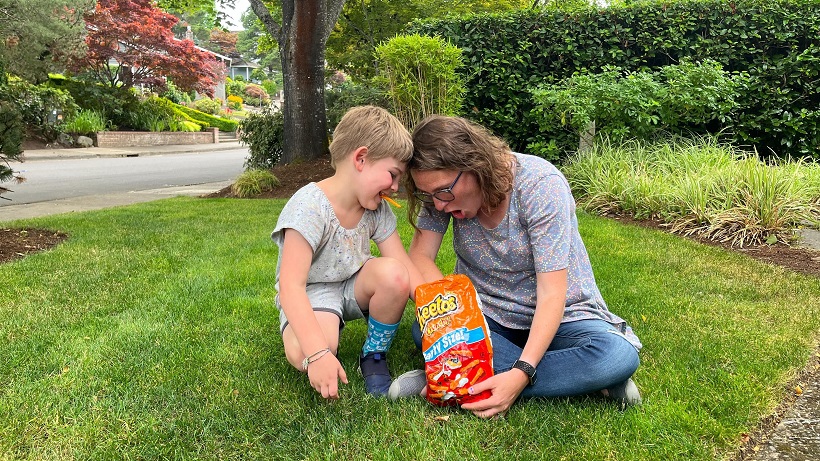Am I the only one who can’t keep certain foods in the house because I can’t keep myself from eating them? Pre-Covid, our house had just a small assortment of salty snacks, mostly because I simply could not eat them in moderation. When we found ourselves home all the time with two children who were constantly hungry for a snack, we quickly tired of constantly putting food in bowls and then washing those bowls. Instead, we opted for single serving packages of all their favorites (Chex Mix, potato chips, Cheez-Its, Cheetos) so we could put them in an easily accessible place and not have to spend the whole day portioning food. While we’ve gone back to bulk sizes to avoid waste, unfortunately now we’ve gotten in the habit of having all my favorite snack foods readily available at home, and I’ve had to find a way to keep myself from grazing on them all day every day.

The truth is I’m a big believer in moderation and learning my limits, I just didn’t want to with these foods. My original plan of keeping minimal pantry items may have worked for me, but it wasn’t the right choice to keep them from my other family members who enjoy them. As with so many parts of our lives, temptation is best overcome by digging in and understanding our limits and boundaries.
The Torah periodically shows us types of temptation to avoid, and each time is another reminder of how powerful our choices can be. Parshat Vaetchanan continues with the retelling of the laws here again in the book of Deuteronomy. We also read about God’s persistent refusal to allow Moshe to enter the Land of Israel. The Torah issues a caution to uphold the mitzvot as the key to building an Israelite society, Moshe sets three cities of refuge, and we receive what is the most well-known instruction in the Torah, the Shema.
Among these rules and rehashing of appropriate worship, in chapter four we read about all the objects and beings of God’s creation. The sky, the sun and stars, animals, human kind. And, while talking about how awe-inspiring those creations are, the Torah tells us not to worship them. This is a warning against the sultry seduction of the idolatry practiced in the nations that surround the Israelites. But this section of text makes you wonder: if the Torah is concerned that we’ll stray from our worship of God to worshiping the natural world, why were these celestial bodies and earthly wonders even created? In other words, if I can’t keep my hands out of the bag of Cheetos, why keep them in the house?
For one thing, the rest of creation is critical to our survival. Clearly there’s a difference between humankind needing the sun’s light and my “needing” a bag of Cheetos. But even more than that, the gift of choice is one of the signs of the divine spark within us. The free will we have to choose to eat for nourishment (and maybe occasionally for pleasure) and to choose to maintain our faith is the true gift of life.



